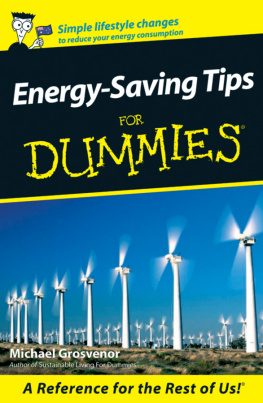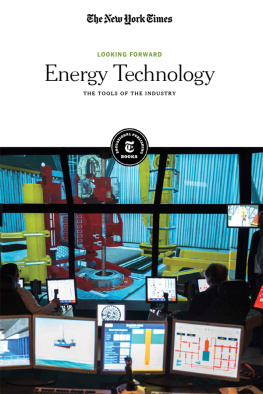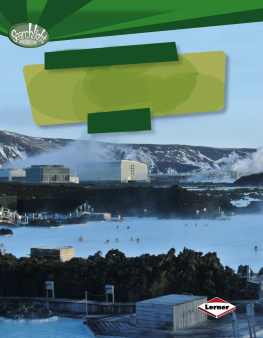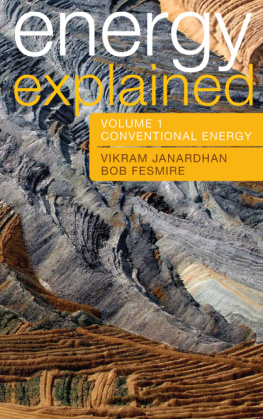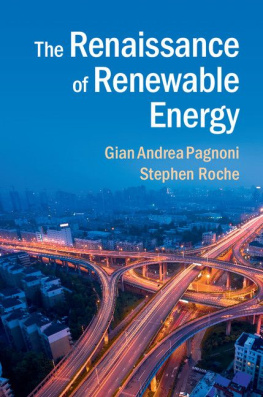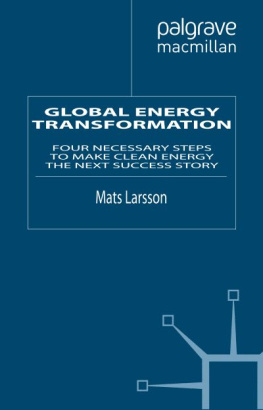I could not have written a book with this breadth without learning a lot from my students and other researchers who collaborated with me at the University of Texas at Austin and elsewhere. I am very grateful for their work to advance the state of scientific understanding. There are too many people to name, but a few of them are called out with more specificity below.
I also could not have written this book without the financial support to do so. I want to thank Doron Weber and the Alfred P. Sloan Foundation for their support via a book grant, which gave me the resources and time I needed to draft the book despite my various other professional commitments. Research support and other financial contributions from the Sloan Foundation, Cynthia and George Mitchell Foundation, Texas State Energy Conservation Office, US Department of Energy, National Science Foundation, Itron, and many other individuals, foundations, and corporate sponsors helped generate some of the new facts and findings that underpin this book. A hallmark of an advanced society is its willingness to invest in the future, so those who are willing to sponsor forward-looking research are part of a rarefied and important group. I thank them for their confidence in my students and their willingness to give them a chance to succeed. This book is just one manifestation of those sponsors generosity.
Eric Henney and T. J. Kelleher, my editors at Basic Books, and project editor Stephanie Summerhays and copyeditor Beth Partin were excellent collaborators and gave me many useful suggestions for revision. Melissa Chinchillo at Fletcher and Company represented me well. Many of the chapters contained sections that were originally fleshed out for magazine articles. I want to thank Mark Fischetti at Scientific American, Megan Sever at Earth magazine, and Jeffrey Winters at ASMEs Mechanical Engineering magazine. They are all very patient editors and have worked with me on multiple occasions to help me turn my various ideas about energy into words that other people can understand.
I have received important coaching along the way, which helped make this book possible. The Presidential Leadership Scholars (PLS) program, which is a bipartisan leadership training program organized by the George W. Bush Center in Dallas, Texas, and the William J. Clinton Center in Little Rock, Arkansas, gave me the opportunity to hone my leadership and thinking skills over a five-month intensive period in 2018 that included guided self-reflection and collaboration with emerging leaders nationwide. That the presidents and their staffs take the time to meet with people like me is testament to their belief in our potential to solve problems collaboratively. I learned much from them. In addition, I have worked closely with Johnnie Johnson of World Class Coaches, which helped me stay focused on my vision and mission. I would like to thank Johnnie and the PLS programs for giving me the boost I needed.
Writing this book required me to expand my knowledge beyond the typical scope of my energy teaching and research. For my process of self-guided learning, some books were particularly instructive to me. Vaclav Smil is a prolific writer whose holistic view aligns well with my thinking and has taught me a lot. His books are standard-bearers and he continues to produce timeless work that is a useful starting point for energy researchers and enthusiasts. My friend Martin Doyles book The Source was a fantastic resource for the role of rivers in America. And Bill Cronons book Natures Metropolis was transformative for me, as it taught me the interconnectedness of rural and urban areas, with significant implications for water, food, cities, wealth, and transportation. Bruce Hunt taught me a lot as a co-advisor to my undergraduate thesis in the mid-1990s and as author of Pursuing Power and Light, which was a useful reference for me on the history of the power sector. Larayne Dallas and Dennis Trombatore at the University of Texas libraries helped me chase down some hard-to-find facts, for which I am grateful.
I have spent many hours over the last decade talking about energy with Roger Duncan, and his perspectives, especially about the future, have been very influential for me. I also frequently discuss energy with Russell Gold, who always has a unique insight to share. I want to thank my mother for introducing me to Arthur C. Clarkes writings. His funny, optimistic views on the future, combined with his exasperation with the lack of creativity by his contemporaries, informed the Prologue and Epilogue.
The water chapter was based on a whole host of work from various students and collaborators, in particular Professor Ashlynn Stillwell at the University of Illinois at Urbana-Champaign, Professor Kelly Sanders at the University of Southern California, Dr. Carey King at the University of Texas at Austin, and Professor Emily Grubert at Georgia Tech. I also collaborated with Professor Erica Belmont at the University of Wyoming, and Drs. F. Todd Davidson, Yael Glazer, and Emily Beagle on water production from hydrocarbons. The importance of womens freedom and access to resources was written with Sheril Kirshenbaum, who also shows up as a co-author in the epilogue for rethinking energy education. I learned a lot from Martin Doyle and lean heavily on his book The Source: How Rivers Made America and America Remade Its Rivers. I also find Peter Gleick and David Sedlak to be go-to resources for all things water. Juan Miro taught me that the Aztec word for city is water mountain.
The food chapter built extensively on work by Dr. Amanda Cuellar on the energy implications of animal waste and food waste. Dr. Kelly Sanders taught me the differences in the carbon intensities of wheat versus beef. Catherine Birney, Dr. F. Todd Davidson, and Katy Franklin were collaborators for the assessment of foodprints. Isabella Gee taught me about meal delivery kits. Recent work with Dr. Charlie Upshaw and Heather Rose on the food-energy-water nexus makes an appearance in the discussion about urban farms. Dr. Colin Beal taught me a lot about life-cycle analysis of the food system. He and his father, Dr. Bill Beal, Professor Emeritus at Virginia Tech, provided thoughtful comments on the Prologue and the chapter on food, for which I am grateful. Professor Frank Mitloehner at University of California at Davis was the first person who really opened my eyes to the potential of reducing the environmental impacts of the food system by tackling its waste. I am still learning from him today. Professor Vijaya Nagarajan at the University of San Francisco taught me a new perspective on food waste and morality and gave me permission to quote one of her essays at length; I am grateful for both.
The transportation chapter includes references to work on mobility services by Dr. F. Todd Davidson, Gordon Tsai, and Zhenhong Lin at the Oak Ridge National Laboratory. Some of the top-level numbers on electrified transportation were quantified by Dr. Joshua Rhodes. I also learned from Dr. Kara Kockelman, who remains a world leader on modeling complex transportation systems. Impromptu conversations with Alan Lloyd and Dave Tuttle opened my eyes to some features of hydrogen or electrified transportation, for which I am thankful.
For the wealth chapter, my visit to Versailles was eye-opening. Though I had been there twice before, going there with Sandrine Voillet (http://sandrinevoillet.com) was a whole new experience, and I am very thankful for the rich details she taught me. I want to thank Professor Brian OGallachoir, whose social media postings tipped me off to the Electricity Supply Board archives in Ireland.
The cities chapter built on my partnership with Austin Energy and Pecan Street, where I learned a lot about the smart grid. I learned from Raj Bhattarais holistic view of the world and tried to capture some of that perspective when discussing the problem of managing waste.


